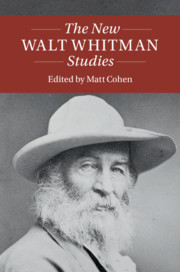Book contents
- The New Walt Whitman Studies
- Twenty-First-Century Critical Revisions
- The New Walt Whitman Studies
- Copyright page
- Contents
- Figures
- Contributors
- Acknowledgments
- Introduction
- Part I The New Life of the New Forms: Aesthetics, Disciplines, Politics
- Part II Wet Paper Between Us: New Reading Methods
- Chapter 6 Whitman in Your Pocket: The History of the Book and the History of Sexuality
- Chapter 7 “All Thy Wide Geographies”: Reading Whitman’s Epistolary Database
- Chapter 8 Haptic Feelings
- Chapter 9 Walt Whitman’s Leaves
- Part III A Kosmos: The Critical Imagination
- Index
Chapter 8 - Haptic Feelings
from Part II - Wet Paper Between Us: New Reading Methods
Published online by Cambridge University Press: 03 November 2019
- The New Walt Whitman Studies
- Twenty-First-Century Critical Revisions
- The New Walt Whitman Studies
- Copyright page
- Contents
- Figures
- Contributors
- Acknowledgments
- Introduction
- Part I The New Life of the New Forms: Aesthetics, Disciplines, Politics
- Part II Wet Paper Between Us: New Reading Methods
- Chapter 6 Whitman in Your Pocket: The History of the Book and the History of Sexuality
- Chapter 7 “All Thy Wide Geographies”: Reading Whitman’s Epistolary Database
- Chapter 8 Haptic Feelings
- Chapter 9 Walt Whitman’s Leaves
- Part III A Kosmos: The Critical Imagination
- Index
Summary
Recent calls for post-critique have proceeded from the twin assumptions that “critique” has been the dominant form of literary scholarship in the United States and that “compositionism” offers something qualitatively new. However, Whitman’s writings on compost and composition illustrate that compositionist thinking is not that new. In addition, the writings of one of Whitman’s earliest exponents, Japanese-German émigré and literary critic Sadakichi Hartmann, exemplify how abstentions from critique appeared decades prior to the institutionalization of critique in the American academy. Hartmann’s Conversations with Walt Whitman(1895),a memorial pamphlet published a year after the older poet’s death, enters into a spiritual dialogue with the principles of composition outlined by Whitman in Specimen Days & Collect(1882). A close analysis of this dialogue illustrates the value of understanding abstentions from critique and turns to composition as recurrent, nonexceptional modes of American racial and national formation.
- Type
- Chapter
- Information
- The New Walt Whitman Studies , pp. 144 - 160Publisher: Cambridge University PressPrint publication year: 2019

